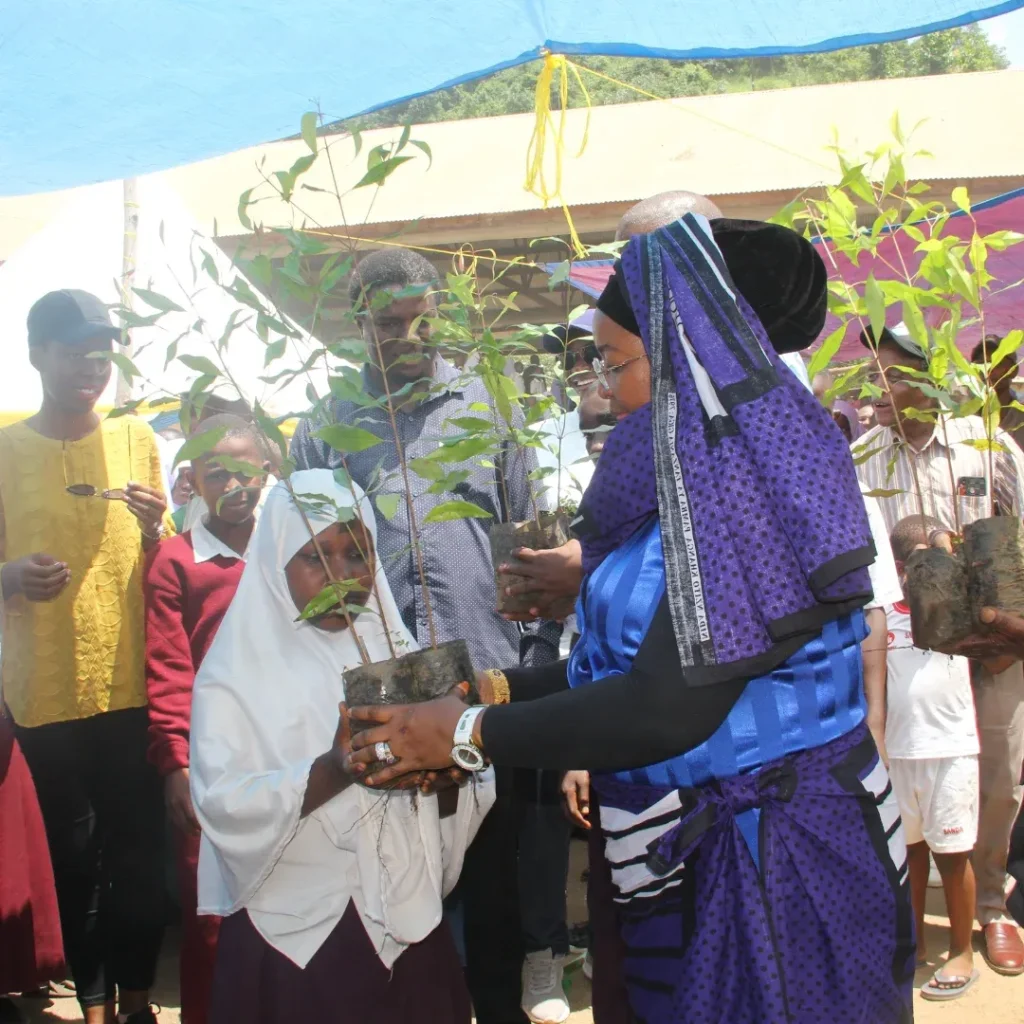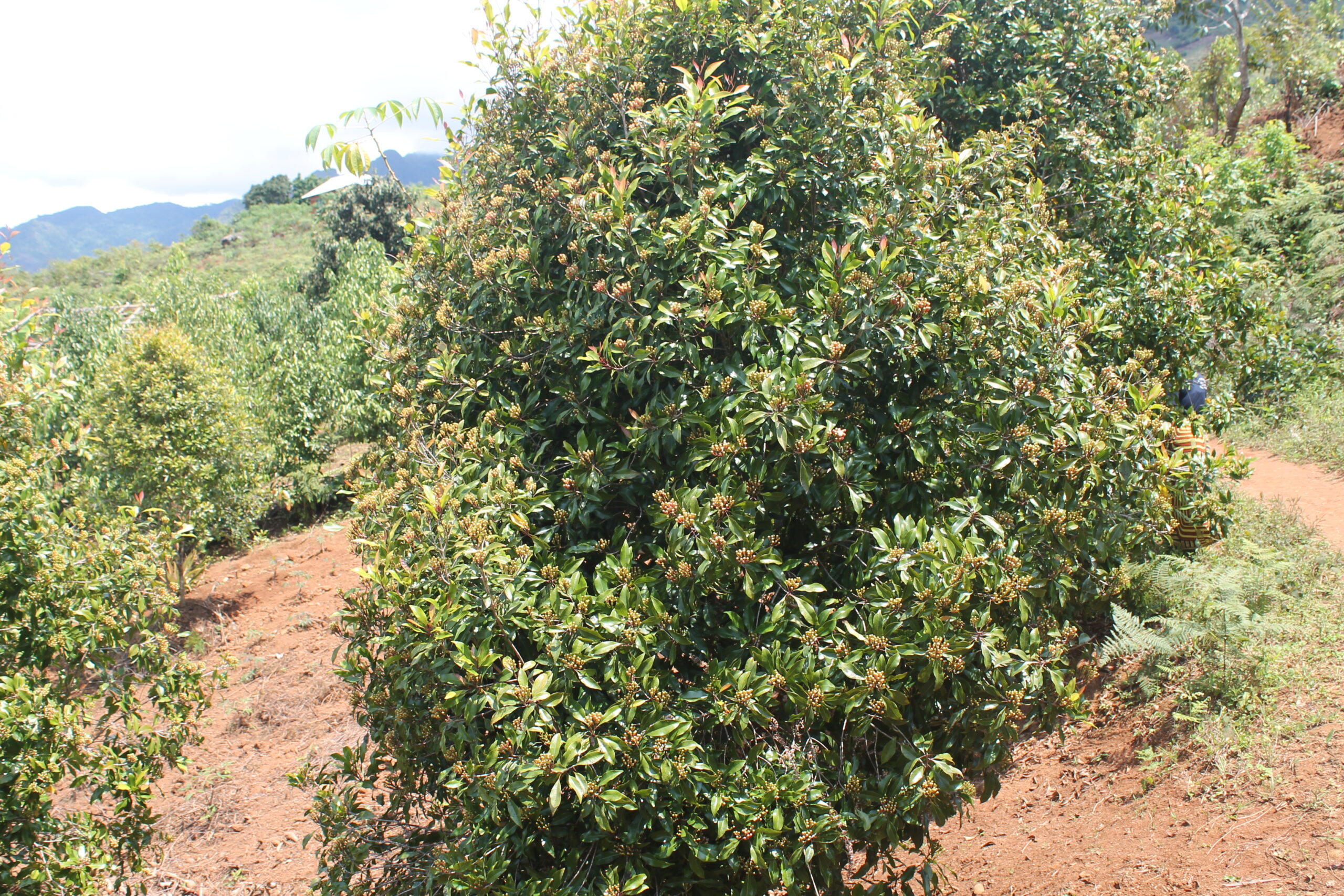On February 17, 2025, the tranquil village of Mkuyuni in Morogoro District Council came alive excitedly as it hosted the launch of an innovative initiative called Soma na Karafuu (“Learn with Cloves”). This groundbreaking program intertwines education and agriculture, offering a unique opportunity for students to learn while cultivating cloves—a crop steeped in history, economic value, and cultural significance.
The event was graced by distinguished guests, including the Hon. Adam Malima, Regional Commissioner; the Hon. David Silinde, Deputy Minister of Agriculture; and the Hon. Deo Mwanyika, MP and Chair of the Parliamentary Committee on Industries, Trade, Agriculture, and Cooperatives. The occasion marked the continuation of a transformative partnership within the Southern Agricultural Growth Corridor of Tanzania (SAGCOT) Spice Value Chain and commitment to restoring biodiversity in the majestic Uluguru Mountains.
A Seedling for Every Student
During the ceremony, 8,110 clove seedlings were distributed to 811 Form One students from five secondary schools in Kinole, Mkuyuni, Tawa, Kiroka, and Matombo wards. Valued at over 26 million Tanzanian shillings, these seedlings represent more than just plants—they symbolize hope, empowerment, and financial independence for young learners.
“This initiative aims to remove the financial burden that often prevents students from continuing their education,” explained Hon. Adam Malima, Regional Commissioner. By promoting sustainable clove cultivation, the program ensures that students can access substantial economic returns by reaching Form Four. Whether they advance to higher education or return to their villages, the income generated from clove farming can help them achieve self-sufficiency.
Bridging Gaps in Trade and Pricing
One of the key challenges faced by clove farmers in Tanzania has been the presence of exploitative middlemen who drive down prices. To address this issue, Hon. David Silinde, Deputy Minister of Agriculture, outlined plans to regulate spice crop pricing, ensuring fair compensation for farmers. “We are committed to eliminating inefficiencies in the supply chain so that our farmers receive the true value of their hard work,” he stated.
Hon. Deo Mwanyika echoed this sentiment, emphasizing Soma na Karafuu’s potential to enhance students’ income prospects significantly. He urged stakeholders to scale up the initiative nationwide, highlighting its dual benefits of educational support and economic empowerment.
Dr. Mussa Ali Mussa, Regional Administrative Secretary (RAS), underscored the campaign’s broader implications, noting its positive impact on family incomes and regional development. “This is not just about planting trees; it’s about building resilient communities,” he said.
Pascal Petro Gabriel, one of the participating students, expressed his enthusiasm for the program. “I am grateful for this opportunity to contribute to my education and secure my future livelihood through clove farming,” he shared.
Strategic Importance of Spices in National Development
Deputy Minister of Agriculture, Hon. David Silinde, reiterated the government’s focus on spice crops under the “BBT” program, acknowledging their pivotal role in the National Development Vision 2050. Dr Hussein Mohamed Omar, Deputy Paramanet Secretary, Ministry of Agriculture, further emphasized the strategic importance of spices like cloves in achieving long-term national goals.
“The Morogoro region is renowned not only as one of the country’s food baskets but also as a hub for export crops, particularly spices,” said John Nakei, Acting Head of Cluster Development at SAGCOT Centre. “Through initiatives like Soma na Karafuu , we aim to catalyze transformative change in education and agriculture.”
History and Value of Cloves
Cloves, native to the Maluku Islands of Indonesia, have been traded globally for centuries due to their aromatic properties and medicinal uses. Historically, cloves were so valuable that European powers vied for control over their production, leading to significant geopolitical shifts during the Age of Exploration.
Today, cloves remain a highly sought-after spice, prized for their use in cooking, perfumery, and traditional medicine. Global demand continues to grow, driven by increasing awareness of their health benefits and versatility in various industries.
World Prices and Economic Impact
Global clove prices have fluctuated between $3,000 and $6,000 per metric ton in recent years, depending on factors such as harvest yields, market demand, and geopolitical conditions. Tanzania ranks among the top producers of cloves, alongside Indonesia and Madagascar, contributing significantly to the country’s export revenue.
Cloves offer smallholder farmers in regions like Morogoro a lucrative cash crop capable of transforming lives. With proper support systems in place, including access to markets and fair pricing mechanisms, the growth potential is immense.
Looking Ahead
The launch of Soma na Karafuu represents a bold step toward integrating education and agriculture in a way that empowers youth and revitalizes rural economies. As the program expands, it holds promise for creating a new generation of skilled farmers equipped to meet the demands of modern agriculture while preserving the rich heritage of clove cultivation.
By nurturing minds and land, Soma na Karafuu embodies the spirit of sustainability and innovation—essential for driving progress in Tanzania and beyond.

